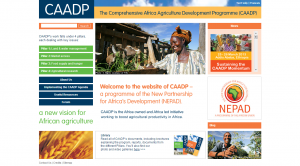MOTIVATION
After years of declining investment in rural development and low agricultural productivity, the African Union Commission launched the Comprehensive Africa Agriculture Development Programme (CAADP) in 2003. Participating African governments committed to allocate 10 percent of their national budgets to agriculture in order to help achieve a 6 percent annual agricultural growth rate. With USAID support, IFPRI has provided technical assistance to more than 20 countries to plan and implement the program, and carried out analysis of long-term growth and poverty reduction options to guide CAADP roundtables, technical reviews, and business meetings.
As countries move into the implementation phase of CAADP, IFPRI is ensuring that countries and regions have access to data, knowledge, and tool through the Regional Strategic Analysis and Knowledge Support System (ReSAKSS), and creating a critical mass of Africa-based economic modeling experts through the African Growth and Development Policy (AGRODEP) Modeling Consortium. IFPRI is also providing support to the United States government’s Feed the Future Initiative (FTF), by monitoring and evaluating FTF efforts and providing empirical evidence on project outcomes.
OUTCOMES
CAADP/RESAKSS
- IFPRI’s analyses on agricultural growth and investment options for poverty reduction in 23 countries fed into their various CAADP implementation and dialogue processes including roundtables, compacts, and national agriculture investment plans. To date, 30 countries and ECOWAS have held CAADP roundtables while about 26 countries have investment plans.
- The 30 national compacts signed during the CAADP roundtables contain specific commitments on agricultural policy, budgetary expenditures, development assistance, and policy dialogue to ensure that countries meet the CAADP growth and budget targets. The Regional Strategic Analysis and Knowledge Support Systems (ReSAKSS) and IFPRI have led efforts to establish 15 country level Strategic Analysis and Knowledge Support Systems (SAKSS) to provide data, knowledge, and tools at the country level.
- ReSAKSS tracks 30 core indicators to facilitate policy dialogue, peer review, benchmarking, and mutual learning processes of the CAADP implementation agenda. Each year, it publishes an Africawide Annual Trends and Outlook Report , the official CAADP monitoring and evaluation report that is presented at the annual CAADP Partnership Platform meeting.
- The investment plans and technical review results from the compacts have allowed 11 African countries—Burundi, Ethiopia, the Gambia, Liberia, Malawi, Niger, Rwanda, Senegal, Sierra Leone, Tanzania, and Togo—to secure a total of $430.5 million from the multidonor Global Agriculture and Food Security Program to help finance their agricultural investment plans. The plans have also allowed several bilateral agencies, including USAID under the US government’s Feed the Future Program, to start scaling up agricultural sector and food security assistance to a number of African countries.
AGRODEP
- The AGRODEP Consortium is an initiative aimed at positioning African experts to take a leadership role in the study of strategic development questions and the broader agricultural growth and policy debate facing African countries. AGRODEP now has 157 individual members from 27 African countries who are receiving capacity strengthening support through training programs and access to research grants, data, and economic modeling tools from the Consortium. The specific objective of AGRODEP is to build upon an emerging critical mass of local modelers and the growing number of high quality data sets to create a world-class modeling community in Africa. Specifically, AGRODEP will create a modeling infrastructure to give access to state of the art methodologies and tools and establish a database, making use of existing data sources and setting up a clearing house mechanism to ensure the availability of high quality data for strategic analysis.
FEED THE FUTURE
- As part of its support to the Feed the Future (FTF) program, IFPRI conducted a highly influential study that led to the lifting of the maize export ban in Tanzania. The Prime Minister of Tanzania quoted the IFPRI study during his keynote speech at a conference on “Accelerating Agricultural Transformation in Tanzania through Partnership” by saying "the research provided clear and convincing evidence on the export ban" and that his Government was taking steps to "deal with the findings." The Prime Minister went on to announce that the Government had lifted the export ban.
- The FTF FEEDBACK project, led by Westat and involving IFPRI, the University of North Carolina and Tango International as subcontractors, will conduct roughly 20 impact evaluations of FTF projects in Africa, Asia and Central America. IFPRI leads the Impact Evaluation Working Group on FEEDBACK, which plays a coordinating role on the 20 impact evaluations. IFPRI is also taking the lead on impact evaluations in Ghana, Kenya, Mozambique, Rwanda, Senegal, and Uganda.



